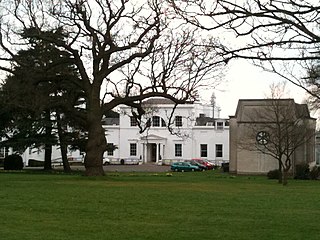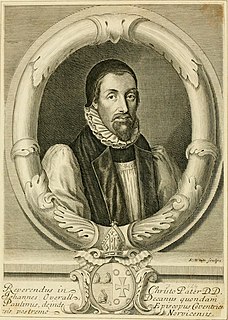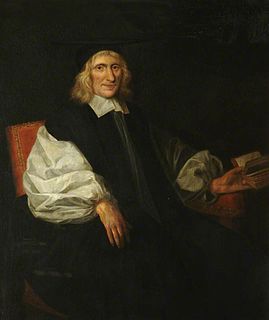Related Research Articles
William Whittingham was an English Puritan, a Marian exile, and a translator of the Geneva Bible. He was well connected to the circles around John Knox, Bullinger, and Calvin, and firmly resisted the continuance of the English liturgy during the Marian exile. At last, he was ordained by the Presbyterians in Geneva. Upon his return to England, he became a well-known opponent to the rites of the Church of England. Through the patronage of the Earl of Leicester, he was collated to the Deanery of Durham, but in 1579 action was started to deprive him of all holy orders on account of his Presbyterian ordination. The process of deprivation was in process, when Whittingham died in 1579. The full record of Whittingham's appointment and trial may be found in Strype's Annals, II.ii., pp. 167, 168, 620.

Cuthbert Tunstall was an English Scholastic, church leader, diplomat, administrator and royal adviser. He served as Prince-Bishop of Durham during the reigns of Henry VIII, Edward VI, Mary I and Elizabeth I.
Thomas Thirlby, was the first and only bishop of Westminster (1540–50), and afterwards successively bishop of Norwich (1550–54) and bishop of Ely (1554–59). While he acquiesced in the Henrician schism, with its rejection in principle of the Roman papacy, he remained otherwise loyal to the doctrine of the Roman Catholic Church during the English Reformation.
Thomas Watson (1515–1584) was a Catholic Bishop, notable among Catholics for his descriptions of the Protestant Reformation. Historian Albert Pollard described Watson as "one of the chief Catholic controversialists" of Mary Tudor's reign.

Oak Hill College is a conservative evangelical theological college located on Chase Side in Southgate, London, England. Its aim is to prepare men and women from the Church of England and Independent churches for ministry in the real world.

John Overall (1559–1619) was the 38th bishop of the see of Norwich from 1618 until his death one year later. He had previously served as Bishop of Coventry and Lichfield, as Dean of St Paul's Cathedral from 1601, as Master of Catharine Hall from 1598, and as Regius Professor of Divinity at Cambridge University from 1596. He also served on the Court of High Commission and as a Translator of the King James Version of the Bible.
Thomas Langley was an English prelate who held high ecclesiastical and political offices in the early to mid-15th century. He was Dean of York, Bishop of Durham, twice Lord Chancellor of England to three kings, and a Pseudocardinal. In turn Keeper of the King's signet and Keeper of the Privy Seal before becoming de facto England's first Foreign Secretary. He was the second longest serving Chancellor of the Middle Ages.
Richard Sampson was an English clergyman and composer of sacred music, who was Anglican bishop of Chichester and subsequently of Coventry and Lichfield.
Henry Cole was an English Roman Catholic churchman and academic.
Richard Nykke was bishop of Norwich, the last Roman Catholic to hold the post before the Henrician reform. Described as "ultra-conservative", but also "much-respected", he maintained an independent line and was embroiled in conflict until blind and in his last years. He is often called the last Catholic bishop of the diocese, but that title is also claimed by John Hopton, bishop under Mary I of England. Norwich at this time was the second-largest conurbation in England, after London.
John Harpsfield (1516–1578) was an English Catholic controversialist and humanist.
David Pole was an English Roman Catholic churchman and jurist; he was bishop of Peterborough from 1557 until deprived by Queen Elizabeth I.
Richard Cheyney was an English churchman, bishop of Gloucester from 1562. Opposed to Calvinism, he was an isolated and embattled bishop of the reign of Elizabeth, though able to keep his see.

Thomas Wood (1607–1692) was an English churchman, Bishop of Lichfield and Coventry from 1671 to 1692.
Robert John Freeman is a British Anglican bishop. From 2011 until his 2018 retirement, he served as the Bishop of Penrith in the Church of England Diocese of Carlisle. Previously, he was the Archdeacon of Halifax from 2003 to 2011. From August 2018 he was appointed as Honorary Assistant Bishop in the Diocese of Leicester.

The Anglican Diocese of Leeds is a diocese of the Church of England, in the Province of York. It is the largest diocese in England by area, comprising much of western Yorkshire: almost the whole of West Yorkshire, the western part of North Yorkshire, the town of Barnsley in South Yorkshire, and most of the parts of County Durham, Cumbria and Lancashire which lie within the historic boundaries of Yorkshire. It includes the cities of Leeds, Bradford, Wakefield and Ripon. It was created on 20 April 2014 following a review of the dioceses in Yorkshire and the dissolution of the dioceses of Bradford, Ripon and Leeds, and Wakefield.
Paul John Slater is an Anglican bishop. Since 2018, he has been the Bishop of Kirkstall, a suffragan bishop in the Diocese of Leeds. He was Archdeacon of Craven from 2005 to April 2014, Archdeacon of Richmond and Craven from April 2014 to July 2015, and Bishop of Richmond from 2015 until his title changed in 2018.
Ian Jagger is a retired British Anglican Priest. From 2006 until retirement, he served as the Archdeacon of Durham, a senior priest in the Diocese of Durham, Church of England. After parish ministry in the Diocese of London, the Diocese of Oxford, and the Diocese of Portsmouth, he was Archdeacon of Auckland from 2001 to 2006.
Edmund Steward otherwise Stewart or Stewarde was an English lawyer and clergyman who served as Chancellor and later Dean of Winchester Cathedral until his removal in 1559.
References
- Lee, Sidney, ed. (1896). . Dictionary of National Biography . 48. London: Smith, Elder & Co.
- The Archdeacons of Leicester 1092-1992 by Terence Cocks
| This article about an English Anglican cleric is a stub. You can help Wikipedia by expanding it. |